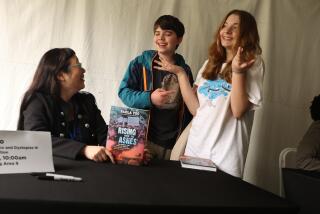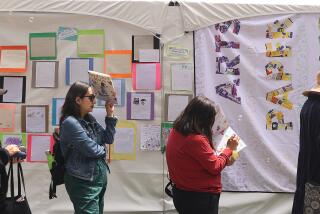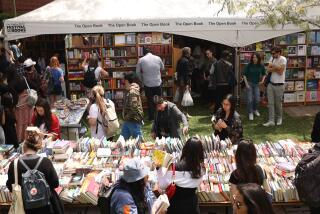Ben Yagoda explains how not to write bad. Badly, that is.
Ben Yagoda, a teacher and writer, is bringing a work to the Festival of Books that should be of particular interest to the aspiring writers in attendance. His new book is “How to Not Write Bad,” a conversational how-to that can help point the way to avoiding the pitfalls of bad writing.
Yagoda studied at Yale and is the author of “Will Rogers: A Biography.” He is a professor at the University of Delaware, and some of the questions that led to his book have come up in his classes. He’ll be at the Festival of Books on April 20 at 3:30 p.m.
Titling your book “How to Not Write Bad” is bound to capture the attention of nit-picky grammarians -- that should be “badly,” right? Is the book geared for teachers more than writers?
Yes, definitely “badly” would be standard usage. But it sounds so dull, doesn’t it? I wanted to wrong-foot people a little with the title, and give them a sense that this topic might actually be fun.
I would say it’s equally pitched to teachers, students, and anyone who is or wants to be a writer. How’s that for a broad audience?
Are you looking forward to anything in particular at the Festival of Books this year?
I’ve been going over the schedule and trying to figure out how I can be in multiple places at once. A lot of writers I know and/or admire are participating, and I’m going to try to catch as many as possible: M.G. Lord, Kevin Starr, Leo Braudy, Tom Bissell, Pico Iyer, D.T. Max, and a bunch of others. I’m also going to try to hear Paul Anka and Debbie Reynolds, in part because they’re relevant to the book I’m currently working on, about the popular music of the 1950s.
Will you be doing anything in Los Angeles apart from the festival?
Seeing some old friends, getting an In-N-Out burger or three, as well as as many possible kinds of ethnic food as possible.
Do you have a favorite book about Los Angeles, or favorite L.A. author?
I like the usual suspects: the Didions, the Nathanael Wests, the Raymond Chandlers, the Ross MacDonalds. But I also really liked a couple of obscure books from the ‘70s: “Bike Riding in Los Angeles” by Marc Norman, and “Slow Days, Fast Company: The World, the Flesh, and L.A.” by Eve Babitz.
How has technology changed the mistakes you’ve seen your writing students making?
Probably the biggest single thing is spell-check, which they’ve come to rely on to an extent that their spelling muscles, never especially robust to begin with, have atrophied. So I get a lot of things like “it’s” instead of “its,” as well as more creative ventures like the student who referred to her “pampas boyfriend” and the one who wrote a profile of “a heroine attic.”
What do you think of Twitter and its effect on written (or, well, typed) language?
Like a lot of newfangled developments, Twitter has yielded some excellent writing -- sharp and (of course) pithy. It definitely lends itself to humor, and comics like Steve Martin, Albert Brooks, and Colin Quinn are masters. Of course, it’s not so great with complexity, subtlety, or depth, all of which are things we could use a lot more of.
What have you been reading lately?
The best book I’ve read all year is Andrew Solomon’s “Far From the Tree.” I just finished an excellent book called “The Secret History of Vladimir Nabokov” by a friend of mine, Andrea Pitzer. As I mentioned, I’m working on a book about 1950s music, and I’ve read many, many books related to that subject. One I’d especially recommend is “The House That George Built,” by the late Wilfrid Sheed.
ALSO:
Kate Atkinson’s ‘Life After Life’ is a clever creation
In death will Margaret Thatcher speak -- in an authorized bio
Julia Sweeney on her new book, life as a mom and coming to L.A.
Carolyn Kellogg: Join me on Twitter, Facebook and Google+
More to Read
Sign up for our Book Club newsletter
Get the latest news, events and more from the Los Angeles Times Book Club, and help us get L.A. reading and talking.
You may occasionally receive promotional content from the Los Angeles Times.







